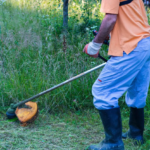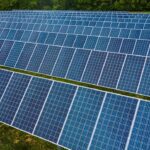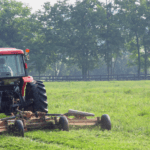Weeds not only disrupt the aesthetic value of your solar farm but also can significantly impact energy production and maintenance costs. Left unchecked, these unwanted plants can grow quickly, covering your panels with an unsightly, overgrown mess. The good news is that you can control this with the help of efficient vegetation management services.
What Are Weeds, and Why Do They Matter?
Weeds are simply plants that grow where they aren’t wanted. These hardy plants are opportunistic and have an incredible ability to thrive even in harsh conditions. Common weeds like thistle, ragweed, and grasses can quickly infest a solar farm, causing a range of problems.
Weeds compete with solar panels for sunlight, reducing the amount of energy they can absorb. This translates to lower energy production and decreased ROI. Tall weeds can even cast shadows on the panels, further hindering their efficiency.
How Weeds Impact Solar Farm Operations
Weeds often have aggressive root systems that go deep into the soil, making them difficult to remove. They’re also known to sprout quickly and outgrow other plants, leaving them to dominate the area they’re in. In a solar farm setting, this can be a major issue, as weeds can rapidly spread across the site. Here are some ways it affects your solar farm operations:
- Reduced Energy Production: Weeds obstruct sunlight, leading to significant energy losses.
- Increased Maintenance Costs: Weeds require regular mowing or herbicide application, adding to operational expenses.
- Fire Hazard: Dry weeds pose a serious fire risk, potentially damaging equipment and disrupting operations.
- Pest Harborage: Weeds can attract rodents and insects that may damage wiring or other components.
- Equipment Damage: Overgrown weeds can hinder access for maintenance and cleaning, potentially causing damage to panels.
How to Prevent Weeds from Taking Over Your Solar Farm
Effective weed control is crucial for maximizing energy output and minimizing maintenance costs. Here’s how to keep weeds at bay:
1. Implement a Comprehensive Vegetation Management Plan
Develop a well-structured weed management strategy that takes into account the local climate, vegetation types, and environmental conditions. This starts with regular inspections to identify and address weed growth early on.
You can also partner with a professional vegetation and land management company to ensure consistent results. This is especially important for larger solar farms that require advanced tools and equipment.
2. Use Proactive and Reactive Strategies
Proactive strategies focus on prevention, while reactive techniques address existing infestations. Installing barriers and laying mulch can prevent weeds from taking root. Mulch serves as a protective layer, blocking sunlight from reaching the soil and preventing weed seeds from germinating.
Reactive techniques include herbicide application, manual removal, and targeted mowing. While mowing can be labor-intensive, it provides excellent long-term results. You can also use selective herbicides to target specific weed species while minimizing harm to the environment. Consult with experts to choose the right herbicide and application method.
3. Maintain Accessible Areas for Inspections
Right-of-way clearance is crucial to ensure easy access for maintenance, inspections, and weed control. Regular clearance maintenance helps you keep track of potential issues before they become serious problems. This can also ensure easy access to emergency services in the event of firebreaks or other issues.
If weeds continue to be a persistent issue despite your best efforts, it may be worth considering professional weed control services. At A&G Weed Control, our expert team can apply specialized treatments that are both effective and safe. Contact us today to get a custom plan to optimize your solar farm’s performance.






0 Comments